I've always been fascinated by the world of event planning and management. The excitement of creating an event from start to finish is amazing. But, many people ask, "What's the difference between these two roles?"
In Indonesia's lively event scene, knowing the difference between event planning and management is key. Both need special skills, strategies, and duties for a smooth event1. Event planning is one of the most stressful jobs, needing the ability to solve unexpected problems1. Event management, on the other hand, covers the whole event process, from planning to after the event1.
To succeed in this field, it's important to understand the main differences between these roles. Whether you're experienced or new, knowing the specific tasks, goals, and tools of event planning and management can help your event shine.
Key Takeaways
- Event planning and event management are distinct roles with unique responsibilities and skillsets.
- Event planning focuses on the detailed preparation and execution of an event, while event management oversees the entire event lifecycle.
- Successful event planning requires adaptability, problem-solving, and excellent communication skills.
- Effective event management involves strategic planning, resource allocation, and continuous evaluation.
- Understanding the differences between these two roles is crucial for delivering exceptional events in Indonesia.
Understanding Event Planning
Event planning is all about creating unforgettable experiences. It's about making sure the event speaks to the audience and matches the event's vision2. It starts with setting clear goals, knowing who the audience is, and picking the right venue. This creates an atmosphere that pulls everyone in2.
Key Components of Event Planning
Good event planning has several important parts. These parts work together to make the event a success. They include:
- Setting clear goals for the event
- Learning about the audience and what they like
- Finding a venue that fits the event's theme
- Creating experiences that grab and hold the audience's attention
- Working with vendors to make the event real
- Planning out the event's timeline and logistics
- Marketing the event to get people to come
Skills Required for Event Planning
Planning events well needs special skills. Event planners need to be:
- Creative to come up with new and exciting events
- Detail-oriented to make sure everything goes smoothly
- Good at solving problems to handle any issues that come up
- Skilled at managing money to use resources wisely
- Expert at working with vendors to get the best service
- Good at talking to people to work with all the different groups involved
- Flexible to adjust to changes and unexpected things
With these skills, event planners can guide the event planning process. They can make sure the event coordination is top-notch and leaves everyone impressed342.

Understanding Event Management
Event management is all about planning and running an event from start to finish. It covers everything from planning to checking how it went after. The team includes people like logistics coordinators, technical directors, and on-site managers4.
Definition of Event Management
Event management is about planning and running events like conferences, festivals, and weddings. It involves making sure everything goes smoothly and the event is a success4.
Roles in Event Management
The main roles in event management are:
- Logistics Coordinators: They handle the venue, vendors, and logistics to keep things running smoothly.
- Technical Directors: They take care of the technical stuff like sound, lights, and stage setup.
- On-Site Managers: They manage the event on the day, solve problems, and keep things on track.
Skills Required for Event Management
Good event managers need certain skills, such as:
- Strong leadership and decision-making to lead a team and make quick decisions.
- Great problem-solving skills to find solutions to unexpected problems.
- Excellent communication to work well with everyone involved.
- Attention to detail to make sure everything is planned and done right.
- Being adaptable and flexible to handle changes and adjust plans as needed.
They must be able to handle many tasks at once, prioritize, and stay calm under pressure4.
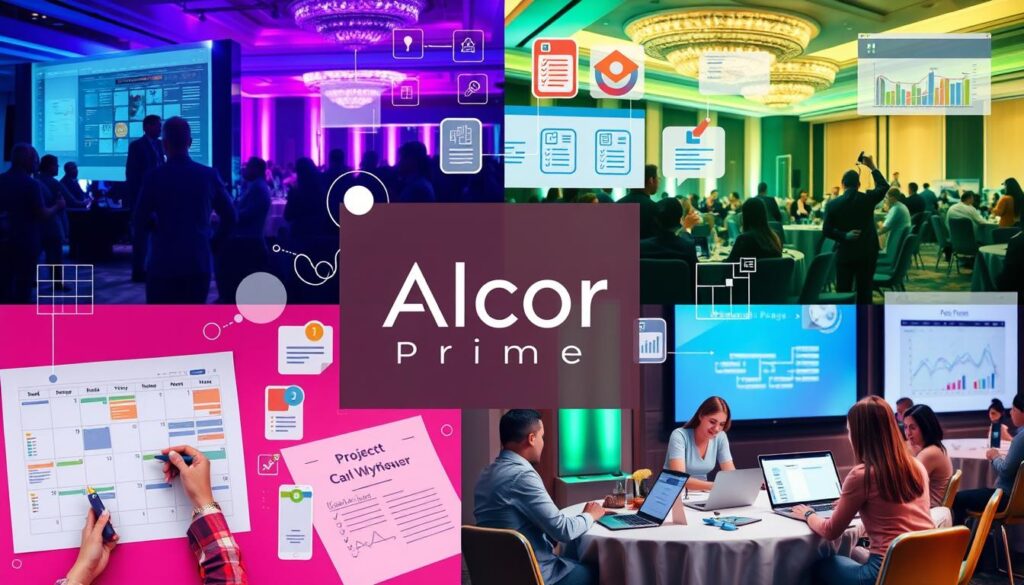
"The goal of successful event management is to create an extraordinary experience for attendees, while seamlessly coordinating all the moving parts behind the scenes." - Jane Doe, Event Management Strategist
Knowing what event management is, who does what, and what skills are needed helps organizers plan and run great events. These events leave a lasting impression on everyone who attends5.
| Key Differences | Event Planning | Event Management |
|---|---|---|
| Scope of Responsibilities | Comprehensive planning of all event elements, from conception to execution. | Overseeing the entire event lifecycle, including logistics, on-site management, and post-event evaluation. |
| Timing of Involvement | Engaged early in the planning process, often immediately after the event is announced. | Typically involved closer to the event date, focusing on the final stages and day-of execution. |
| Cost and Investment | Higher due to longer involvement and broader scope of responsibilities. | Usually more budget-friendly for couples who have done most of the planning. |
Understanding the roles and responsibilities of event planners and managers helps organizers choose the best approach for their event's success4.
Comparison of Goals
Event planning and event management have different goals but aim for success. Event planning focuses on the creative vision and the attendee's experience. Event management, on the other hand, focuses on making the event run smoothly and achieving its goals2.
Objectives of Event Planning
The main goal of event planning is to create a memorable experience for attendees. This includes coming up with the event concept, choosing the right venue, and creating engaging content. Event planners aim to make events that participants will remember2.
Objectives of Event Management
Event management focuses on making sure the event goes off without a hitch. This involves managing resources well and achieving the event's goals. Event managers handle the logistics, work with vendors, and ensure the event runs smoothly. Their goal is to deliver a successful event that meets the client's needs2.
Both roles in the event industry aim to create successful events. However, they have different approaches. Event planners focus on the creative vision and the attendee's experience. Event managers, on the other hand, focus on the operational aspects and achieving the event's goals2.
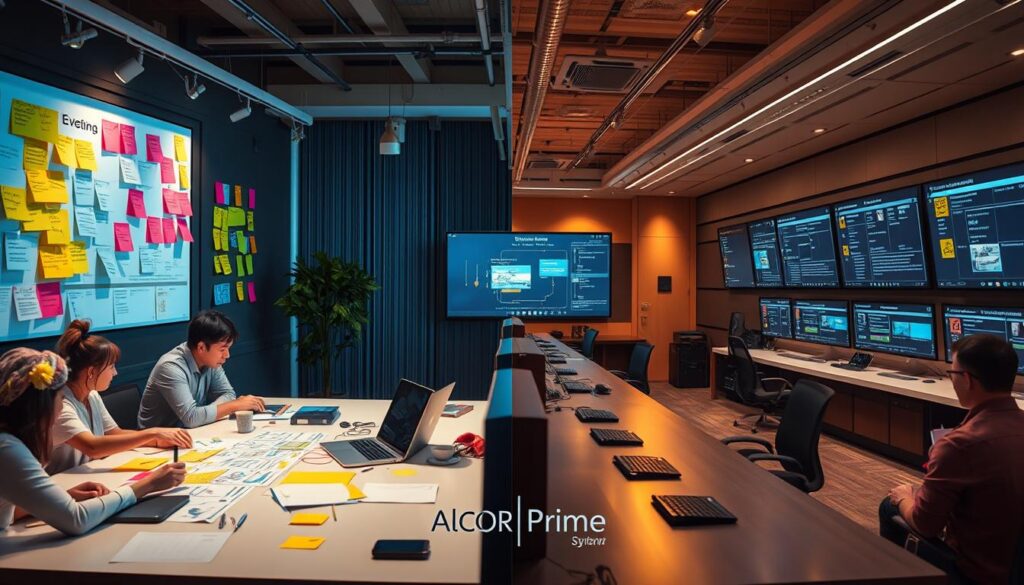
"Sustainability reporting tools like Qondor's can provide event professionals with actionable insights to help clients create more sustainable events, from recommending eco-friendly venues to tracking waste reduction initiatives."6
Event professionals can use sustainability reporting tools to give clients valuable insights. These insights help plan and execute more sustainable events. This meets the growing demand for eco-friendly experiences6.
Event management companies like One8 Event offer comprehensive services for corporate events. They handle a wide range of events, from conferences to award ceremonies7. They work with top venues, provide customized quotes, and use their networks to ensure seamless event execution7.
In summary, event planning and event management share the goal of creating successful events. However, their focus and objectives differ. Event planners focus on the creative vision and attendee experience. Event managers focus on operational excellence and goal achievement. Understanding these differences helps professionals and clients make informed decisions2.
Scope of Responsibilities
Event planning and event management often blend together, but they have their own tasks8. Event planners start by planning the event's concept and strategy. Event managers then handle the day-to-day tasks and coordination8.
Planning Activities
Event planners begin by coming up with the event idea and picking a theme. They also make detailed plans to make sure everything goes smoothly8. They work with others to know what the event aims to achieve and what guests will need8.
Management Activities
Event managers focus on the event's day-to-day running8. They manage the vendors, oversee the team, and keep the event running smoothly8. They also watch how the event is going and fix any problems that come up.
Overlapping Roles
Even though event planners and managers have different jobs, they share some duties8. Both handle the event's budget, talk to stakeholders, and adjust to new situations8. Being able to think on your feet and solve problems is key in both roles9.
| Event Planning | Event Management |
|---|---|
| Conceptualizing the event, selecting themes, and creating timelines | Coordinating vendors, managing staff, and overseeing event operations |
| Focusing on the strategic planning of the event | Responsible for the on-site coordination and execution of the event |
| Managing the event budget and communicating with stakeholders | Adapting to changing circumstances and problem-solving |
In summary, event planners and managers share many tasks, especially with money and talking to people8. Being able to handle the fast-changing event world and solve problems is very important for both9.
Event Lifecycle Stages
The event planning process and execution have several key stages. Knowing these stages is vital for managing events well and achieving success.
Planning Phase
The planning phase sets the event's foundation. It includes setting goals, choosing a venue, and making a detailed plan. This plan covers logistics, timeline, and resources needed10. At Cloud 9 Events, planners focus on every detail, helping clients at every step10.
Execution Phase
The execution phase brings the plan to life. Event managers oversee operations, manage vendors, and solve any unexpected issues11. They need to be detail-oriented, solve problems quickly, and think on their feet12.
Post-Event Evaluation
The post-event evaluation is key for checking success and finding ways to improve. It involves getting feedback, looking at finances, and learning from the event11. Planners use this info to make their events better for the future12.
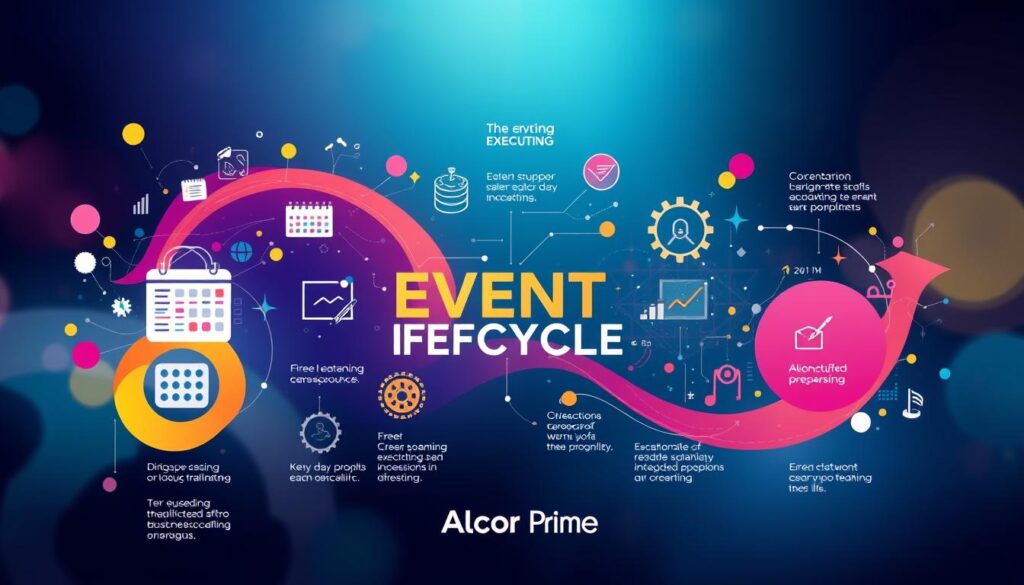
Understanding the event lifecycle stages helps professionals plan better. They can use resources wisely, make processes smoother, and create unforgettable experiences for everyone involved.
Budget Considerations
Managing a budget is key for both event planning and management. These roles have some similarities but also differences in handling finances.
Budgeting in Event Planning
Event planners estimate costs, allocate resources, and find sponsors for their events13. They plan for venue, food, decorations, entertainment, staff, marketing, and logistics14. They must be good at making and managing detailed budgets to keep the event within budget.
Budgeting in Event Management
Event managers track expenses, manage cash flow, and make quick financial decisions13. They handle vendor payments, watch spending, and adjust as needed to keep finances stable14. Their budgets cover project management, logistics, contingency planning, and post-event reviews.
Both planners and managers need to be skilled in budgeting due to common financial challenges13. Accurate budget tracking is key to avoid overspending or running out of funds, which can harm the event's success15.
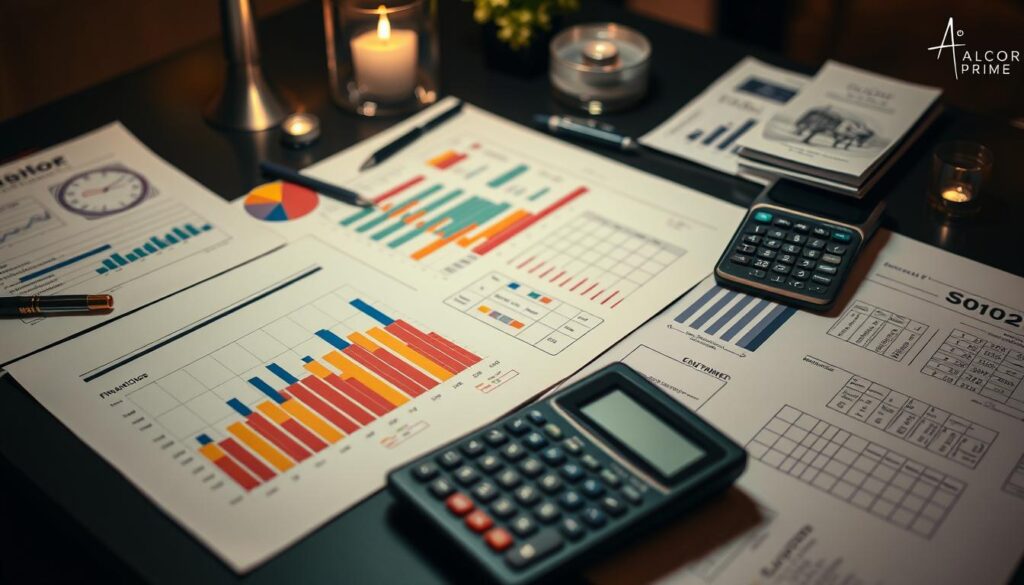
Working together on budgets can lead to better decisions13. Good partnerships between engineering and finance ensure resources are used well13.
"Budgets should be treated as living documents that need continuous review and adjustment."
Engineering leaders must choose between making things in-house or buying them13. Getting finance involved early helps avoid confusion and ensures costs are right13.
Both event planning and management need a strong grasp of finance and budgeting for successful events15. By finding cost-effective ways and using the right resources, event pros can create memorable experiences while keeping finances stable141315.
Tools and Software
Event planning and management have grown more complex. The right tools and software can greatly help. They make operations smoother and more efficient. Event planners and managers use digital solutions for tasks like project management and on-site coordination.
Tools for Event Planners
Event planners use project management software like Asana, Trello, or Basecamp. These tools help organize tasks, assign duties, and track progress. Design applications such as Canva or Adobe Creative Cloud are used to create event materials. Venue selection platforms like Cvent or EventUp make finding the right location easier16.
Tools for Event Managers
Event management software like Aventri, Bizzabo, or Cvent offers features for managing registration, ticketing, and coordination. Communication tools such as Slack or Microsoft Teams help the team work together. On-site management apps like EventMobi or Guidebook manage the event flow and collect feedback16.
Both planners and managers benefit from digital platforms for tasks like registration and marketing. The right tools boost efficiency and handle complex logistics16. The global Event Management Software Market is expected to hit US$ 14.8 billion by 2030, growing at 14.6% annually17.
Using these tools can make event planning and management smoother. It ensures a great experience for organizers and attendees. With the right digital solutions, event professionals can create unforgettable events that meet client expectations.
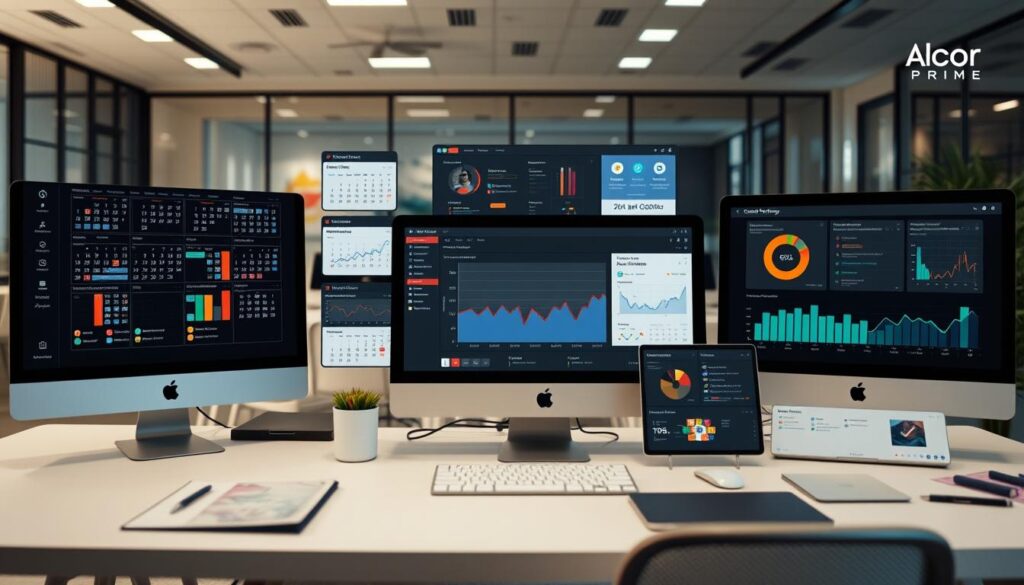
| Event Planning Tools | Event Management Tools |
|---|---|
| Project management software (Asana, Trello, Basecamp) | Event management software (Aventri, Bizzabo, Cvent) |
| Design applications (Canva, Adobe Creative Cloud) | Communication tools (Slack, Microsoft Teams) |
| Venue selection platforms (Cvent, EventUp) | On-site management apps (EventMobi, Guidebook) |
"The right tools can significantly improve efficiency and help in managing complex event logistics."
Importance of Communication
Good communication is key in event planning and management. As a planner, you must share your ideas clearly with clients and vendors18. Event managers also need to keep in touch with their team, suppliers, and guests throughout the event19.
Great communication helps create excitement and manage what people expect. You should talk differently to each group, making sure everyone knows the event's goals18. Event managers must share complex details simply, making it easier to work together and solve problems during the event.
Communication in Planning
In planning, you'll talk a lot with clients to get their ideas and needs. It's important to keep them updated, share detailed plans, and answer questions fast18. You also need to work well with vendors and suppliers, planning out logistics and timelines for a great event.
Communication in Management
When the event starts, managers must keep talking to their team and others. They should share updates, solve problems fast, and give feedback to vendors19. Good communication helps managers handle surprises well, making sure everyone has a good time.
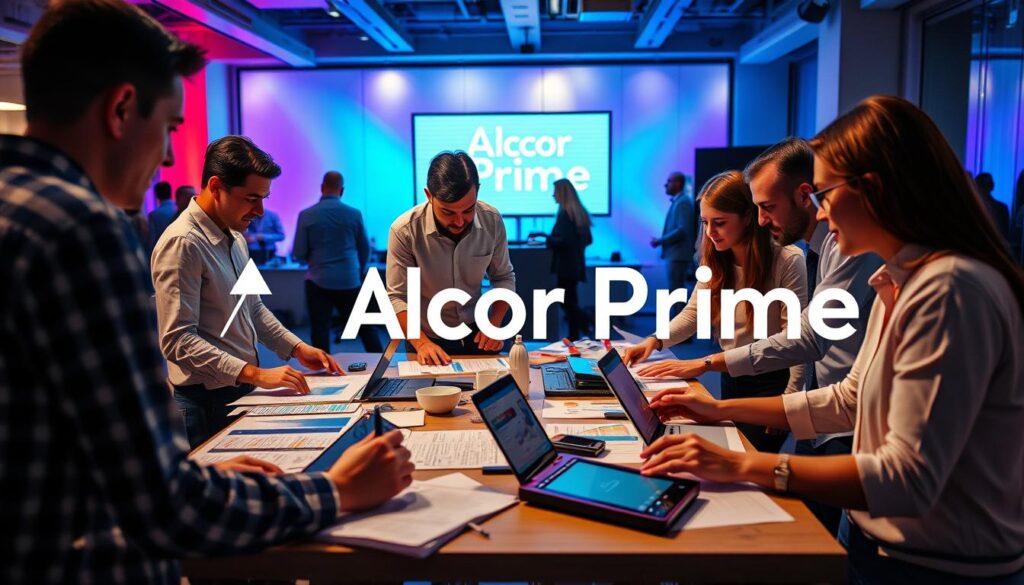
In the end, good communication is essential for planning and managing events. By improving your communication skills and adjusting your style for different groups, you can make events better, build strong relationships, and achieve success.
Case Studies
In Indonesia's event industry, case studies show the difference between planning and management. They cover everything from themed corporate events to big festivals. These examples prove how both roles are crucial for creating unforgettable events.
Successful Event Planning Examples
Planning success stories often talk about creativity and detail. For example, a tech company in Indonesia had a product launch that guests loved. It was a themed experience20. Another example is a fintech startup's corporate gala, which amazed everyone with its unique entertainment and personal touches20. These stories show how planning can make events exciting and memorable.
Successful Event Management Examples
Management success stories focus on solving problems and executing smoothly. A famous music festival in Indonesia is known for its top-notch experiences. This is thanks to the team's skill in handling logistics and working with many people21. An international conference also got praise for its efficient handling of speakers, sponsors, and attendees21. These stories highlight the importance of coordination and adaptability in event management.
Together, these stories from Indonesia's event industry show how planning and management work together. They show the unique value each role brings to an event22. By learning from these examples, event professionals can improve their skills and work better together to create amazing experiences.
| Event Planning | Event Management |
|---|---|
| Focused on creative and detailed event design | Focused on efficient and seamless event execution |
| Emphasizes themes, decor, and personalized touches | Emphasizes problem-solving, coordination, and adaptability |
| Successful examples: Themed product launches, innovative corporate galas | Successful examples: World-class music festivals, large-scale international conferences |
Conclusion and Best Practices
Summary of Key Differences
Event planning and management have different focuses and times in the event cycle. Planning focuses on the creative start and early stages, like strategy and setup23. Management, however, deals with the event's execution, handling all aspects to ensure a smooth experience for guests23.
Tips for Choosing Between Planning and Management
Think about your strengths and what you enjoy. If you're good at solving problems creatively and love design, planning might be for you24. If you're great at organizing and multitasking, and you enjoy the fast pace of event day, management could be your fit25.
Both roles are crucial for successful events in Indonesia's event industry24. Knowing the differences and using your strengths can help make events memorable and impactful23.
FAQ
What is the difference between event planning and event management?
Event planning is about the creative start of an event. Event management is about making it happen smoothly.
What are the key components of event planning?
Key parts of event planning include setting clear goals and knowing your guests. You also need to pick the right venue and create engaging experiences.
What skills are required for event planning?
Event planners need to be creative and detail-oriented. They must also be good at solving problems and managing budgets. Creating a strong event brand is important too.
What is the role of event management?
Event management covers all steps from planning to checking how it went. It involves coordinating logistics, technical aspects, and on-site management.
What skills are required for event management?
Event managers need to lead well, solve problems, and communicate clearly. They must handle many tasks at once and stay calm under pressure.
What are the objectives of event planning and event management?
Event planning aims to create a memorable experience. Event management focuses on smooth execution and efficient use of resources.
What are the differences in planning activities and management activities?
Planning involves coming up with the event idea and choosing themes. Management is about coordinating vendors and overseeing the event. Both roles need to manage budgets and communicate with stakeholders.
What are the different stages of the event lifecycle?
The event lifecycle has planning, execution, and evaluation phases. Planners focus on the early stages, while managers handle the execution.
How do event planners and managers approach budgeting differently?
Planners estimate costs and find sponsors. Managers track expenses and make financial decisions during the event. Both must manage budgets to avoid overspending.
What tools and software are used in event planning and management?
Planners use project management and design tools. Managers use event management software and apps for on-site management. Digital platforms help with tasks like registration and marketing.
Why is effective communication crucial in event planning and management?
Good communication is key in both roles. Planners share event ideas with stakeholders. Managers keep teams and vendors informed during the event. Clear communication builds excitement and ensures everyone is on the same page.
Source Links
- https://www.forbes.com/councils/forbesnonprofitcouncil/2024/11/26/16-questions-to-ask-when-planning-nonprofit-fundraising-events/
- https://www.slideshare.net/slideshow/lesson-2-event-management-guide-for-handling-events/273608024
- https://citationgroup.co.nz/resources/an-employers-guide-to-social-events/
- https://weddingsfromtheheartblog.net/2024/11/26/difference-between-wedding-planner-and-wedding-coordinator/
- https://www.eventplanner.net/
- http://www.qondor.com/blog/sustainability-simplified-how-qondors-new-tool-will-change-the-game-for-meetings-and-events-management
- https://one8event.com/services/
- https://www.charityjob.co.uk/events-manager-jobs
- https://www.airmeet.com/hub/blog/crisis-management-in-webinars-what-to-do-when-things-go-wrong/
- https://c9.events/
- https://www.slideshare.net/slideshow/event-planning-and-fundraising-for-ocean-leaders/273615513
- https://www.hoppier.com/blog/event-planning-problems-and-solutions
- https://jellyfish.co/blog/6-ways-engineering-leaders-should-leverage-data-this-budget-planning-season/
- https://www.slideteam.net/elements-included-in-corporate-budget-plan-corporate-event-ppt-sample.html
- https://www.rocketlane.com/blogs/the-2025-guide-to-professional-services-budget-planning
- https://seahawkmedia.com/wordpress/create-event-management-system/
- https://www.openpr.com/news/3757457/event-management-software-market-set-for-major-growth-at-a-cagr
- https://www.edwardsansweringservice.com/why-you-need-an-event-planning-answering-service/
- https://jobs.bostonscientific.com/job/Marlborough-Corporate-Meetings-and-Events-Planner-MA-01752/1229601000/
- https://www.fivetran.com/case-studies
- https://fiveable.me/key-terms/cognitive-computing-in-business/case-studies
- https://www.energyconnects.com/news/renewables/2024/november/bhutan-studying-green-financing-for-23-billion-hydropower-plan/
- https://medium.com/@swatimishraa/association-meeting-management-a-strategic-approach-for-successful-events-7a0a555eee4e
- https://www.splento.com/blog/marketing/using-ai-in-content-marketing-tips-for-smarter-campaigns/
- https://voltagecontrol.com/blog/navigating-difficult-conversations/





